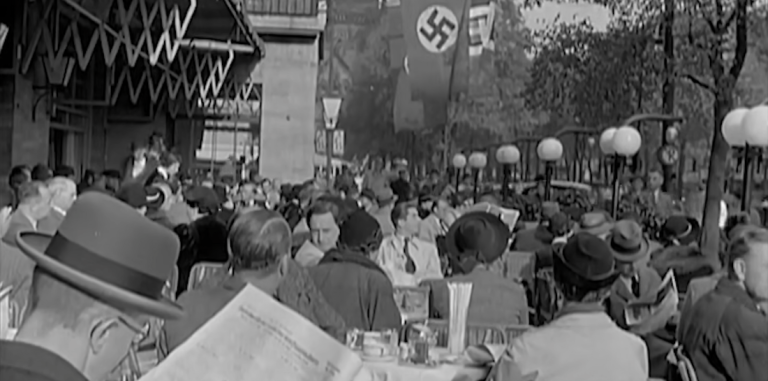
Archival film promises historical insight but forces uneasy confrontation with regime’s seductive, coercive machinery.
New York, N.Y. – A newly released documentary, “Real life in Nazi Germany [UNCENSORED],” utilizing archival footage shot by American filmmaker Julien Bryan in 1937, is generating significant discussion – and profound discomfort – within historical and educational circles.
While its stated aim is purely educational, offering a “rare glimpse” into the daily realities of ordinary Germans four years after Adolf Hitler‘s consolidation of power, the presentation and framing raise persistent, troubling questions about the inherent risks of examining the Third Reich‘s popular support mechanisms.
The documentary meticulously showcases the visible transformation of German society under National Socialism. It highlights the economic recovery seemingly engineered by the regime, transitioning the nation from the Great Depression‘s crushing unemployment to near-full employment fueled by massive public works like the Autobahn.
It delves into the pervasive social structures: the regimented enthusiasm of the Hitler Youth, the state-managed leisure provided by “Strength Through Joy” (Kraft durch Freude), and the omnipresent displays of restored national pride. This surface-level order and purpose, the film argues, were tangible benefits experienced by millions, creating a powerful sense of unity exploited by the regime.
The Filmmaker’s Lens and the Allure of Normalcy
Bryan’s footage, undeniably a valuable historical artifact, captures the appearance of normalcy and even contentment. We see bustling streets, modern factories, families enjoying subsidized holidays, and crowds responding fervently to orchestrated events. The documentary leans heavily on this visual record, emphasizing the “unfiltered” perspective. Yet, this very focus induces a sense of profound unease.
The narration, while explicitly disavowing support for Nazism and acknowledging the
horrific crimes against humanity committed by the regime, simultaneously invites viewers to
“understand the complex and often uncomfortable reasons” for widespread public support.
This framing, however carefully couched in ethical disclaimers, feels perilously close
go providing explanatory context that risks normalizing the foundational evil of the Nazi Party.
Bread, Circuses, and the Machinery of Coercion
While the film mentions “systematic suppression of dissent” and “pressures for conformity,” the visceral impact lies in the depiction of the benefits: jobs, infrastructure, community, and purpose.
The underlying, sinister mechanisms enabling this apparent prosperity – the dismantling of democracy, the Enabling Act, the ruthless suppression of trade unions, political parties, and free press, the early stages of persecution targeting Jews, Roma, political dissidents, and LGBTQ+ individuals through laws like the Nuremberg Laws – feel relegated to necessary footnotes rather than the essential counterpoint they demand.
The propaganda machine, led by Joseph Goebbels, isn’t merely presented as a tool of control; it’s implicitly shown as effective in weaving a seductive narrative that masked terror with tangible progress. This juxtaposition is inherently problematic, potentially fostering a dangerous, albeit unintended, cognitive dissonance.
Navigating the Ethical Minefield of “Understanding”
The documentary walks an ethical tightrope. Its crucial ethical statement is clear: it does NOT support Nazism, glorify the Third Reich, or justify its crimes against humanity.
The inclusion of Nazi symbols is correctly flagged as strictly for documentary and educational purposes. Yet, the very act of focusing so intently on the “lived realities” and “tangible benefits” experienced by many “ordinary” citizens, while essential for comprehensive historical analysis, cannot escape the chilling shadow of the regime’s inherent barbarity.
There’s a palpable nervousness in observing how effectively the Nazi regime manipulated human needs for security, belonging, and dignity to build complicity. The film tentatively asks how support was generated, but the answers it visually provides feel disturbingly resonant, forcing an uncomfortable confrontation with the seductive power of authoritarianism when it delivers stability.
Summary
This documentary uses Julien Bryan’s 1937 footage to depict daily life in Nazi Germany, explicitly condemning the regime’s atrocities while exploring the economic recovery and social programs that fostered public support. It presents a deeply unsettling view of the tangible benefits used by the Nazis to mask repression and build complicity, raising ethical questions about historical representation.—